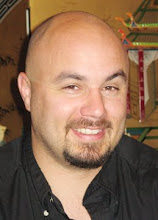Tonight while I was looking for some other information I happened again, after all these years, on this short essay that Leif wrote to on the MySpace blog of the love of his life, J. He sent it to me for comment on February 16, 2008, just over seven weeks before he died. He took a very cynical view of humanity. I found it interesting that he took on what he saw as a coming apocalypse caused by global warming.
The photo was actually taken in August 2003, long before he wrote this piece, but the direct stare seems to me to go with his statements. He was wearing his new SCA armor.
I hope his vision of the future of humanity does not come true, and I am not so sanguine about the survival of the industrial world, but I do think we are in for a lot of horror.
The photo was actually taken in August 2003, long before he wrote this piece, but the direct stare seems to me to go with his statements. He was wearing his new SCA armor.
I hope his vision of the future of humanity does not come true, and I am not so sanguine about the survival of the industrial world, but I do think we are in for a lot of horror.
Leif on Philosophy & Climate Change
Read Kant. He has many ideas, some a bit unrealistic, but among his best thoughts is his idea of peace through conflict, that eventually through war and competition and resolved conflict world peace will be achieved because the costs of war with a trading partner will be too great to bear and it will be unacceptable.Over the years I have studied philosophy, history, political science, psychology, sociology, and anthropology, and have learned one thing. None of these guys had the answers. Truth is a jig-saw puzzle, and at best Marx, Kant, Freud, Locke, Montesquieu, Madison, et al, contributed a piece.Another is that truth is very subjective. What you might find appalling is just fine to others, and those others might find your ideas equally appalling. I have always enjoyed the stark contrast between your excessively compassionate quest to save the world and my ruthless Machiavellian disregard for it.Being a bit of an evolutionary and social darwinist, I look forward to the coming apocalypse of global warming. It will be a glorious catastrophe which will either doom mankind or propel us into the next level of enlightenment. I see this as quite possibly the greatest thing that can happen to man, a mass extinction which will disproportionately affect the parts of the world which are least able to embrace a more intelligent way of living.The industrialized world, which is principally in northern latitudes, is already pushing to go green and is more likely to survive the climate change. Many of the corporations which plague the industrialized world will go bankrupt as the economy collapses.The humans which survive will be smarter and, most importantly, FEWER. Billions will die in China, India, Africa, the Middle East and South America. Oil will quickly become unimportant and religious conflicts with oil-rich Muslims will become a thing of the past as they cease to matter. The survivors will be in a position to continue the next chapter of human development from a much more enlightened perspective.This is, of course, very politically incorrect, but then the PC are like idiots playing chess. They can't see the pieces on the board for the game itself. People can't see past what’s right in front of them. Like my 12-year-old niece playing chess with me at Christmas was fully convinced that she had defeated me and that I was either not trying or not very smart when I allowed her to take my queen early in the game. Later, when I mated her king she could not understand where she went wrong. The difference is the long view. When considering any action you must look down the slippery slope and see how it may snowball into other changes covered by the law of unexpected consequences.Anyway, enough dark proselytizing for one day. - Leif (February 16, 2008)








